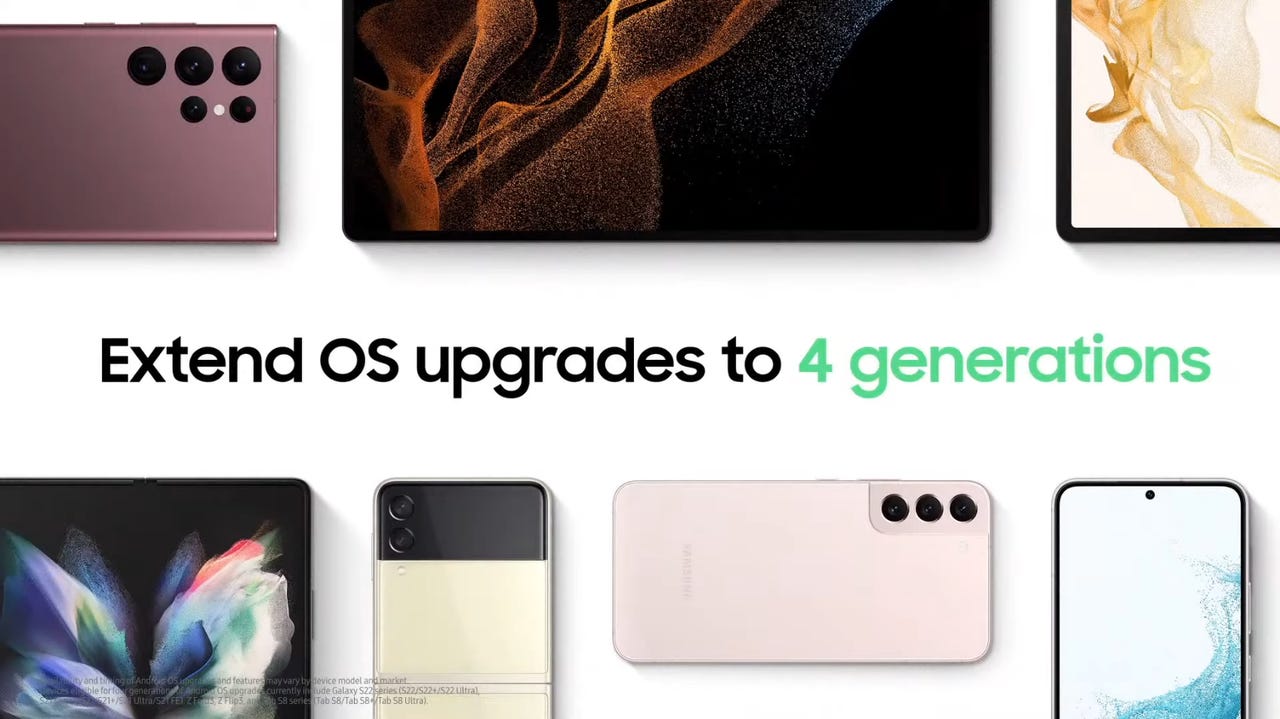































 Image: Samsung
Image: Samsung During yesterday's Unpacked event,Samsung announced a barrage of new smartphones and tablets, digital services, and sustainability initiatives. The most surprising news was saved for last, however, with the company pledging improvements to its mobile software updates -- a contentious issue that has long plagued Android manufacturers.
Starting this year, select Galaxy smartphones, tablets, and smartwatches will be eligible to receive up to four generations of operating system updates and five years of security updates. That includes last year's SamsungGalaxy S21 series and tallies one more year of support to the company's existing standard.
Here's a breakdown of what this change means to Galaxy users, why it matters, and how it fares with the likes of Apple and Google.
This isn't the first time Samsung has committed to extending its Android OS upgrade policy. It made the promise of three years' worth -- up from two -- back in 2020. But with another added year of OS and security support, there's a lot riding on the Korean giant to deliver.
When dissecting the official press release, Samsung states that it's "offering up to four generations of One UI and Android OS upgrades on select Galaxy devices." The "up to" wording should be noted here as it does leave the possibility for Samsung to end its suggested cadence earlier. Fortunately, Samsung has been nothing short of reliable with its updates the past year, so the outlook here is positive.
Here is every Galaxy device that fall under the new update standard:
Just a month ago at CES, Samsung unveiled its "Together for Tomorrow" vision, finding new ways to contribute and build a more sustainable future. This latest commitment by the company not only benefits the end user experience, but serves to lengthen ownership of electronic devices. It's similar to what the folks at Fairphone are doing.
Beneath the shiny, glass builds and multi-camera setups is the software that powers a device. And with reliable and consistent software support, that phone, tablet, or laptop, can be: used for much longer, gain access the latest features, and see general improvements to its security. More importantly, the extended use of tech gadgets greatly reduces the amount of e-waste that plagues landfills annually.
When Google unveiled the Pixel 6 series of phones just months ago, it touted a five-year update commitment, plastering the bold promise on marketing campaigns and social media. However, we quickly discovered that while the latest Pixels would receive five years' worth of security patches, it wasn't the same case with OS updates.
According to Google's support page, the Pixel 6 and 6 Pro are guaranteed to receive Android version updates until at least October 2024, or three years after launch. As the creator of the Android platform and user of an in-house system on a chip (Tensor), you'd expect the Pixel lineup of smartphones to represent the premier Android experience. Putting Google's update commitment next to the Samsung's, however, reveals a significant advantage for the Galaxy-phone maker.
The gold standard of software upgrades is still held by Apple, with the average iPhone receiving at least six years' worth of iOS updates. While Apple hasn't explicitly stated the number of years an iPhone is supported with the latest software versions, we've seen devices as old as the iPhone 6S (2015) get the "New iOS update is now available" pop-up in 2022.
Samsung's four years commitment to OS upgrades falls short of Apple's, but it's encouraging to see the company continue to set its own standards and live up to them. Hopefully, it's enough to pressure more Android manufacturers to follow suit.
 Горячие метки:
Технологии и оборудование
Наш процесс
1. Смартфоны
B. мобильность
Горячие метки:
Технологии и оборудование
Наш процесс
1. Смартфоны
B. мобильность